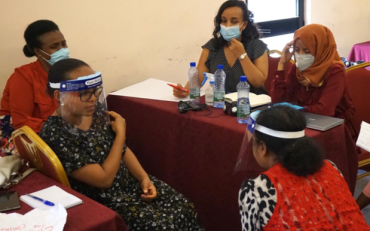The global COVID-19 pandemic drastically transformed human life, many aspects of which have yet to be normalised. While some countries go through waves of high infection rates, and new variations of the virus are being identified, in other regions life is getting back to a semi-normal state due to successful vaccination plans. Many governments are in the process of developing or implementing recovery plans to mitigate some of the economic and social consequences of the pandemic. These rapid changes and unstable conditions particularly impacted marginalised groups including persons with disabilities.
The IDA COVID-19 survey contributes to the growing body of international evidence documenting the disproportionate impact of the pandemic on persons with disabilities, addressing more specifically the situation of underrepresented groups in underreported regions. It is estimated that 80% of persons with disabilities live in developing countries1. Yet, there are considerable gaps in documenting the impact of COVID-19 on their lives at an international level. The survey addresses this gap by mainly focusing on these regions. Developed based on active consultations with persons with disabilities and their representative organisations, the survey adopted plain language, to maximise participation among people who are rarely consulted in research on disability rights, during the pandemic. As an example, 17% of respondents self-identified as having an intellectual disability.
The survey documents the experiences of persons who face multiple and intersecting forms of discrimination, including indigenous groups and racial minorities. It captures the experiences of groups that are not usually consulted, including persons with intellectual disabilities, and parents with disabilities. The survey also highlights the multiple and intersecting forms of discrimination experienced by persons with disabilities in areas where there are natural disasters and humanitarian emergencies.
This report presents the experiences of persons with disabilities, in their own words. It is a mixed methods study, which was conducted in three interrelated stages: descriptive quantitative analysis, thematic qualitative analysis, and statistical testing of hypotheses. The triangulation of the data gives an in-depth insight into the experiences of persons with disabilities during new waves of the pandemic as well as the recovery and reopening phases.
The survey received a total of 600 responses from around the world. The fact that the survey was open only for a short period, combined with digital barriers to accessing the online survey, as well as the multiplication of surveys now proposed can be understood/attributed to have impacted the outreach. However, the diversity of respondents representing different regions and constituencies and also the quality of testimonies shared, resulted in a great source of information about economic and social impact of the pandemic on lives of persons with disabilities around the globe.
Read the Executive Summary and Recommendations in English, French, Spanish, Portuguese, and Arabic.
Read the full report in English.
Based on this survey, RIADIS, The University of Lima, CBM and IDA published a report on the Experience of Persons with Disabilities during the COVID-19 pandemic in Latin America and the Caribbean.
To check the full report in Spanish, please click here.
